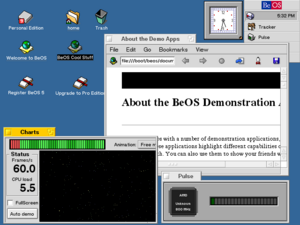BeOS: Difference between revisions
imported>Alex Bravo No edit summary |
imported>Alex Bravo No edit summary |
||
| Line 29: | Line 29: | ||
|} | |} | ||
'''BeOS''' is an [[operating system]] for [[personal computers]] which began development by [[Be Inc.]] in 1991. It was first written to run on [[BeBox]] hardware | '''BeOS''' is an [[operating system]] for [[personal computers]] which began development by [[Be Inc.]] in 1991. It was first written to run on [[BeBox]] hardware and, unlike some other operating systems of the time, BeOS was written from scratch and took therefore advantage of modern hardware. Optimized for digital media work, its GUI was developed on the principles of clarity and a clean, uncluttered design. | ||
==History== | |||
==Description== | |||
BeOS made full use of [[Symmetric multiprocessing|multiprocessor]] systems by utilizing modular I/O bandwidth, pervasive [[multithreading]], [[preemptive multitasking]] and a custom [[64-bit]] [[Journaling file system|journaled file system]] known as [[Be File System|BFS]]. The [[application programming interface|API]] was written in [[C++]] for ease of programming. It has [[POSIX]] compatibility and access to a [[command line interface]] through the [[bash]] shell, although internally it is not a Unix-derived operating system. | |||
==Versions== | |||
{| class="wikitable" | |||
|- | |||
! Release !! Date !! Hardware | |||
|- | |||
| DR1 - DR5 (Developer Release) | |||
| align=center|October 1995 | |||
| [[AT&T Hobbit]] | |||
|- | |||
| DR6 | |||
| align=center|January 1996 | |||
| align=center rowspan="6" | PowerPC | |||
|- | |||
| DR7 | |||
| align=center|April 1996 | |||
|- | |||
| DR8 | |||
| align=center|September 1996 | |||
|- | |||
| Advanced Access Preview Release | |||
| align=center|May 1997 | |||
|- | |||
| PR1 (Preview Release) | |||
| align=center|June 1997 | |||
|- | |||
| PR2 | |||
| align=center|October 1997 | |||
|- | |||
| R3 | |||
| align=center|March 1998 | |||
| align=center rowspan="6" | PowerPC<br />Intel x86 | |||
|- | |||
| R3.1 | |||
| align=center|June 1998 | |||
|- | |||
| R3.2 | |||
| align=center|July 1998 | |||
|- | |||
| R4 | |||
| align=center|November 1998 | |||
|- | |||
| R4.5 "Genki" | |||
| align=center|June 1999 | |||
|- | |||
| R5 PE/Pro "Maui" | |||
| align=center|March 2000 | |||
|- | |||
| R5.1 "Dano" | |||
| align=center|November 2001 | |||
| align=center rowspan="1" | Intel x86 | |||
|} | |||
==References== | |||
<references /> | |||
==See also== | |||
* [[Haiku (operating system)|Haiku]] | |||
==External links== | |||
* [http://www.beincorporated.com/ Be, Inc.] official website. | |||
* [http://www.bebits.com BeBits] is a resource for BeOS software. | |||
Revision as of 11:26, 12 April 2007
| BeOS |

|
| Desktop screenshot of BeOS R5.0.1 PE |
| Website: http://www.beincorporated.com/ |
| Developer: Be Inc. |
| OS family: BeOS |
| Source model: Closed source |
| Latest stable release: BeOS R5.0.3 / March, 2000 |
| Supported platforms: AT&T Hobbit, x86, PowerPC |
| Kernel type: Modular hybrid kernel |
| Default user interface: Graphical user interface |
| License: proprietary |
| Working state: Stopped |
BeOS is an operating system for personal computers which began development by Be Inc. in 1991. It was first written to run on BeBox hardware and, unlike some other operating systems of the time, BeOS was written from scratch and took therefore advantage of modern hardware. Optimized for digital media work, its GUI was developed on the principles of clarity and a clean, uncluttered design.
History
Description
BeOS made full use of multiprocessor systems by utilizing modular I/O bandwidth, pervasive multithreading, preemptive multitasking and a custom 64-bit journaled file system known as BFS. The API was written in C++ for ease of programming. It has POSIX compatibility and access to a command line interface through the bash shell, although internally it is not a Unix-derived operating system.
Versions
| Release | Date | Hardware |
|---|---|---|
| DR1 - DR5 (Developer Release) | October 1995 | AT&T Hobbit |
| DR6 | January 1996 | PowerPC |
| DR7 | April 1996 | |
| DR8 | September 1996 | |
| Advanced Access Preview Release | May 1997 | |
| PR1 (Preview Release) | June 1997 | |
| PR2 | October 1997 | |
| R3 | March 1998 | PowerPC Intel x86 |
| R3.1 | June 1998 | |
| R3.2 | July 1998 | |
| R4 | November 1998 | |
| R4.5 "Genki" | June 1999 | |
| R5 PE/Pro "Maui" | March 2000 | |
| R5.1 "Dano" | November 2001 | Intel x86 |
References